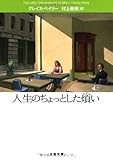ちょっと前に「翻訳」について採り上げたときに*1、タイトルのみ言及してほったらかしにしていたSam Anderson氏の村上春樹訪問記”The Fierce Imagination of Haruki Murakami”*2を思い出した。そこから村上春樹と「翻訳」について書かれた部分をコピーしておく。
“He is always shuttling us back and forth between worlds.” これを踏まえて、
さらに、「翻訳」というのは村上春樹作品全体を貫く〈本質〉であるとまで言い切ってしまう;
This calls to mind the act of translation ― shuttling from one world to another ― which is in many ways the key to understanding Murakami’s work. He has consistently denied being influenced by Japanese writers; he even spoke, early in his career, about escaping “the curse of Japanese.” Instead, he formed his literary sensibilities as a teenager by obsessively reading Western novelists: the classic Europeans (Dostoyevsky, Stendhal, Dickens) but especially a cluster of 20th-century Americans whom he has read over and over throughout his life ― Raymond Chandler*3, Truman Capote, F. Scott Fitzgerald, Richard Brautigan, Kurt Vonnegut*4. When Murakami sat down to write his first novel, he struggled until he came up with an unorthodox solution: he wrote the book’s opening in English, then translated it back into Japanese. This, he says, is how he found his voice. Murakami’s longstanding translator, Jay Rubin, told me that a distinctive feature of Murakami’s Japanese is that it often reads, in the original, as if it has been translated from English.
ところで、小説家としての村上春樹と翻訳家としての村上春樹を結びつけて論じた評論・研究があるのかどうかは知らず。また、村上春樹が訳したグレイス・ペイリー『人生のちょっとした煩い』を昨年買ったけれど、まだ読んでいないことも思い出す*5。
You could even say that translation is the organizing principle of Murakami’s work: that his stories are not only translated but about translation. The signature pleasure of a Murakami plot is watching a very ordinary situation (riding an elevator, boiling spaghetti, ironing a shirt) turn suddenly extraordinary (a mysterious phone call, a trip down a magical well, a conversation with a Sheep Man) ― watching a character, in other words, being dropped from a position of existential fluency into something completely foreign and then being forced to mediate, awkwardly, between those two realities. A Murakami character is always, in a sense, translating between radically different worlds: mundane and bizarre, natural and supernatural, country and city, male and female, overground and underground. His entire oeuvre, in other words, is the act of translation dramatized.

- 作者: グレイスペイリー,Grace Paley,村上春樹
- 出版社/メーカー: 文藝春秋
- 発売日: 2009/06/10
- メディア: 文庫
- 購入: 2人 クリック: 28回
- この商品を含むブログ (32件) を見る
*1:http://d.hatena.ne.jp/sumita-m/20111105/1320511640
*2:http://www.nytimes.com/2011/10/23/magazine/the-fierce-imagination-of-haruki-murakami.html See http://d.hatena.ne.jp/sumita-m/20111023/1319332692
*3:See also http://d.hatena.ne.jp/sumita-m/20070321/1174443344
*4:See also http://d.hatena.ne.jp/sumita-m/20070413/1176447434